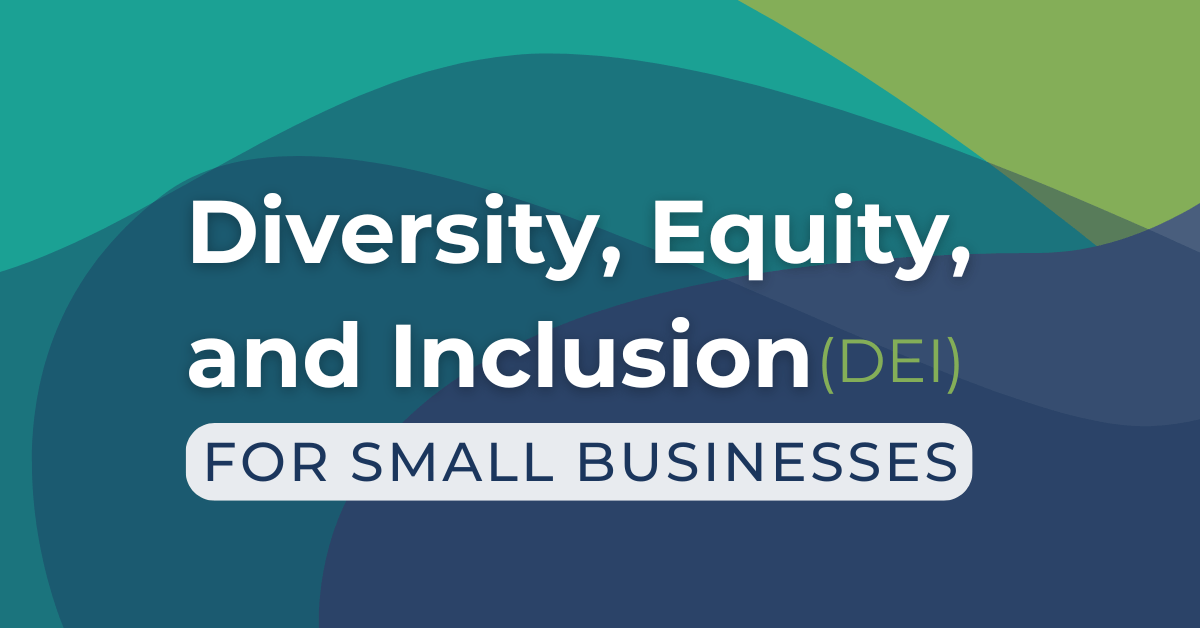Diversity, Equity, and Inclusion (DEI) for Small Businesses
February 7th, 2025 | 3 min. read
By Tara Larson

Have you ever walked into a room full of people you don’t fully know yet and immediately thought, “Yes, these are my people!”? What was it about that group that made you feel that way? Maybe you shared a similar sense of style, or the sound system was playing a song from that obscure band you love. First impressions matter, and they often determine whether we want to invest our time, energy, and resources into something.
As small business owners, we should be thinking about how our business makes people feel from the first interaction. Does our hiring process make candidates feel valued and fairly considered? Do our customers and employees see themselves reflected in our branding and workplace culture?
Creating an inclusive business isn’t just about checking a box, it’s about intentionally fostering a space where people feel like they belong.
Why Does Prioritizing Inclusivity Matter?
Inclusivity isn’t just a feel-good initiative; it has tangible benefits for small businesses. Here’s why prioritizing inclusivity can be a smart business move:
1. Improved Reputation
Word of mouth and reputation are everything for small businesses, and many customers actively seek out businesses that demonstrate inclusiveness in their hiring practices, marketing efforts, and company culture. Prioritizing inclusivity can help businesses set themselves apart, attract a broader customer base, and stay relevant in an evolving marketplace.
2. Better Employee Engagement and Retention
Employees who feel respected, valued, and included are more engaged and motivated at work. Inclusive workplaces foster a sense of belonging, which in turn reduces turnover. When employees feel safe and appreciated, they are more likely to stay and contribute positively to the company’s success.
3. Increased Innovation and Creativity
Diverse perspectives drive innovation. When businesses embrace these perspectives, they benefit from different viewpoints, ideas, and problem-solving approaches. This diversity of thought can lead to more creative solutions, better decision-making, and ultimately, a stronger competitive edge.
4 Ways to Make Your Small Business More Inclusive
Big businesses may have entire departments dedicated to diversity, equity, and inclusion (DEI), but that doesn’t mean small businesses can’t make meaningful changes. Here are some practical steps to build a more inclusive business:
1. Evaluate Your Current Practices
Take a critical look at your hiring process, company policies, and overall workplace culture. Ask yourself:
- Do we have a fair and equitable hiring process?
- Are our job descriptions written in a way that welcomes a diverse pool of applicants?
- Is our interview process structured to minimize bias?
2. Look Beyond Traditional Markers of Diversity
Inclusivity is about more than just race or gender. Consider factors such as:
- Age diversity: Are we hiring and supporting employees across different age groups?
- Family status: Do our policies accommodate employees with caregiving responsibilities?
- Cultural and religious practices: Do we create a workplace where employees feel comfortable observing their traditions?
- Neurodiversity and disabilities: Is our workplace accessible and accommodating to different abilities and learning styles?
3. Set Goals and Take Action
Inclusivity is an ongoing process. Set measurable goals based on your evaluation and work towards them. Some examples include:
- Making physical spaces more accessible for employees and customers with disabilities.
- Offering flexible work arrangements to accommodate different needs.
- Providing training on unconscious bias for hiring managers.
4. Foster an Inclusive Workplace Culture
Inclusivity goes beyond hiring! It should be reflected in everyday interactions and company values. Encourage open conversations and make it clear that all employees have a voice. Promote team-building activities that celebrate diverse cultures and experiences. Inclusivity shouldn’t be something you "implement"—it should be something that’s woven into the fabric of your business.
Start Small, Stay Intentional, And Keep Learning
Inclusivity is not a one-time initiative; it’s an ongoing commitment. As small business owners, we have a unique opportunity to create welcoming environments where employees and customers feel valued. By taking intentional steps toward inclusivity, we not only strengthen our businesses but also contribute to a more equitable and diverse community.
Where can you start today? Maybe it’s tweaking a job posting, asking your team for feedback, or simply taking a moment to reflect on how inclusive your business really is. Whatever it is, take that first step.
At Whirks, we believe that your mission, values, and culture form the foundation of everything else in your business—including inclusivity.
If you’re ready to take the next step in defining what your company stands for and how that impacts your people, check out Create Your Umbrella: Values, Mission, and People.
Topics: